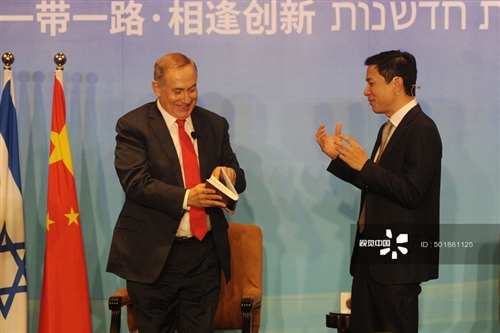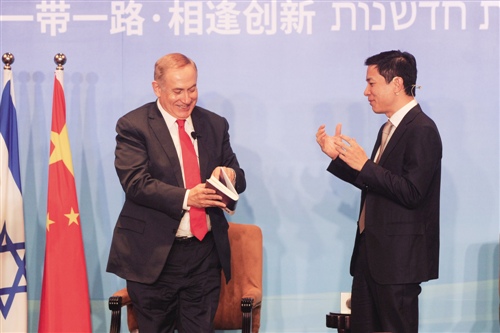(Original title: Israel's Prime Minister meets with giants of Chinese technology companies, Israeli-style innovation is popular.)


Reporter Yang Qingqing reports from Beijing
According to industry sources, about one-third of the funds of Israeli start-up companies come from China. Due to the narrow market in the Israel region, it has an international perspective at the beginning of innovation. Israeli companies are dominated by technological innovation, and Chinese companies are more innovative business models. The two can complement each other.
Israeli-style innovation is increasingly attracting the attention of the people.
From March 19th to 22nd, Israeli Prime Minister Benjamin Netanyahu paid an official visit to China. During this period, he was also surrounded by the presence of Chinese companies. On the 20th, Benjamin Netanya Hu held a breakfast meeting with top leaders from various companies, including Ma Yun, Chairman of Alibaba Group Board of Directors, Liu Chuanzhi, Chairman of Legend Holdings, Shi Yuzhu, Chairman of Giant Network Group, and COO Lu Qi of Baidu. On the afternoon of March 21, Benjamin Netanyahu met with Li Yanhong, CEO of Baidu Co., Ltd. and held talks on such issues as the “Belt and Road Initiative†and “Science and Technology Innovationâ€.
Benjamin Netanyahu is sought after in China and is closely related to Israel’s ability to innovate. “Baidu has many senior executives who are very excited to come back to Israel and come back. They are there and they can hear many innovative ideas every day,†said Li Yanhong during the talks with Benjamin Netanyahu. “Investing in Israel.†Is equivalent to investment in innovation and technology."
On the other hand, the Chinese market is also increasingly attractive to Israeli companies. “There are many technologies in Israel that are hatching and fermenting. If these technologies can be introduced into other markets, new business opportunities can be formed,†said Benjamin Netanyahu, “China’s huge market is what we hope to enter.†And we hope that China can enjoy the benefits of Israeli innovation."
Israeli innovation
On the morning of March 20, Benjamin Netanyahu and 11 Chinese business giants held an elite breakfast meeting, which focused on Israel’s advantages and prospects for cooperation in the field of high-tech innovation. Later, when Benjamin Netanyahu attended the Israeli Prime Minister's Forum on Business Innovation, he continued to appeal to over 500 businessmen in the country to increase their investment in Israeli high-tech companies. On the 21st, when Benjamin Netanyahu met with Li Yanhong, Li Yanhong was invited to visit Israel.
"Israel is not only an incubator for innovation, but also an incubator for cross-border entrepreneurship. China has manufacturing and market capabilities, and Israel has advanced technology," Benjamin Netanyahu said. "China-Israel cooperation is 'a natural match.'"
In fact, as early as several years ago, such cooperation has already begun. Data shows that the investment made by Israeli high-tech companies has increased from 1.924 billion U.S. dollars in 2012 to 4.432 billion U.S. dollars in 2015, and the number of transactions has increased from 545 to 708. Among them, investment from China has become an important one. According to data from the IVC Research Center in Tel Aviv, Israel, in 2015, Chinese capital investment in Israeli start-ups increased by 54% year-on-year to US$467 million.
According to the 21st Century Business Herald reporter, the emerging areas of artificial intelligence, robotics, augmented reality, and virtual reality are particularly active during the process of China’s capital “going to sea†in Israel. In 2014, Baidu, Qihoo 360 and other companies invested 194 million U.S. dollars in Israeli venture capital Carmel Ventures, focusing on data center infrastructure, big data, cyber security, financial technology, etc.; in 2015, Tencent and Renren invested. Israel's upstart Singulariteam focuses on the Internet of Things, robotics, financial technology, and augmented reality.
In addition, from 2016 till now, Alibaba’s Twiggle, Infinity AR and Lumus, and Midea’s Servotronix have also been involved in machine learning and natural language processing, augmented reality and robotics respectively. Shenzhen Guangqi Group also announced the establishment of an international innovation fund in Israel last year, focusing on local companies in the areas of identification, machine intelligence, and augmented reality.
To a certain extent, the pursuit of Chinese capital in emerging areas of Israel also coincides with Israel’s ability to innovate. “Israel’s innovation ecology is relatively sound. From the government, multinational corporations, innovative companies, and innovation education are all highly matched and the division of labor is comprehensive. Each subsystem constitutes a complete innovation ecology,†Lu Benfu, director of the Center for Cyber ​​Economics and Knowledge Management at the University of Chinese Academy of Sciences, told 21 Century Economics Reporter, “At the same time, Israel has its own innovation culture. They summed up their innovations as 'innovations on the neck of the knife' and have a sense of urgency that is different from that of other countries.â€
chemical reaction
Although the Israeli innovation project has been favored by Chinese funds in the past few years, another indisputable fact is that the technology giants of the US Silicon Valley and even the Global 500 have also frequently thrown olive branches at Israel.
Just on the 13th of this month, Intel’s $ 15.3 billion acquisition of Mobileye, Israel’s self-driving start-up company, caused a huge earthquake in the technology industry; similarly earlier this month, Time Warner’s Turner Broadcasting and Coca-Cola formed technology incubators in Israel. Focusing on emerging Israeli technology; in February, Apple acquired RealFace, an Israeli facial recognition technology company, for US$2 million, sparking industry’s technical imagination for the Apple 8 mobile phone; Earlier, companies such as Snapchat and Ebay were Israeli investment projects.
Then, with the frequent attention of global technology giants, what kind of different chemical reactions will result from the encounter between Chinese companies and Israeli companies?
“This year marks the 25th anniversary of the establishment of diplomatic relations between China and Israel. The innovative cooperation between the two countries in science and technology, education, culture, and health will be more in-depth, and the effect of 1+1>2 will be even more prominent.†Chief of Israel’s International Innovation Headquarters, Guangqi Group Executive Officer Li Zhi pointed out to 21st Century Business Herald reporter.
In Li Zhi’s view, Israel is a world-renowned innovation nation, but its domestic market is narrow and it lacks a large-scale commercialization of hi-tech industrialization. China’s current demand for innovation, technology, and industrial transformation and upgrading is very large. There is a vast market for technology applications and resources. "The cooperation between China and Israel in terms of science and technology is more flexible in terms of decision-making processes, market matching, and technology incubation. The industrialization demand and market space are also greater."
Lu Benfu expressed similar views to 21st Century Business Herald reporters. “About one-third of the Israeli start-up company’s funds come from China. The Israeli market is small and it has an international perspective at the beginning of innovation,†said Lu Benfu. “Israeli companies are mostly technological innovation, and Chinese companies are more business models.†The innovations can complement each other."
In the talks with Benjamin Netanyahu, Li also mentioned the potential of Sino-Israeli cooperation. “Many Israeli companies have innovation and ideas, and China has a huge market, with more than 700 million Internet users, and this number is still growing, and this market size is not available in other countries in the world,†said Li Yanhong. "In some areas of innovation, Israel has technology, and China has a lot of data as a basis. The combination of the two can create miracles."
In this regard, Robin Li suggested that Israeli companies should communicate more with Chinese companies, explore the Chinese market, and expand their business in the Chinese market. "Chinese companies can provide a lot of test beds and data pools for Israeli companies. We are open to cooperation with Israeli companies."
This combination may be far more than the current investment and acquisition. "China-Israel cooperation in innovation should be more team integration," Lü Benfu told reporters. "The current Sino-Israeli cooperation is mainly based on Chinese investments and Chinese acquisitions. This is still in the latter part of the innovation. Can the project just At the beginning of the idea, the integration will be carried out. This is the place where the next stage can be explored by China-Israel cooperation."
(Editing: Huang Xin, E-mail:)
USB 2.0 Hub
Another version of USB HUB.When comparing 2.0 and 3.0 there are a few major differences. First the transfer rates: USB 2.0 offers transfer rates of 480 Mbps and USB 3.0 offers transfer rates of 4.8 Gbps - that's 10 times faster. Note that the transfer speeds also depend on the device in use in addition to the bus type and USB ports and cables.

best usb hub ,best usb c hub,usb 2 port hub ,usb 2.0 4 port hub ,usb 2 hub
Pogo Technology International Ltd , https://www.wisesir.net
